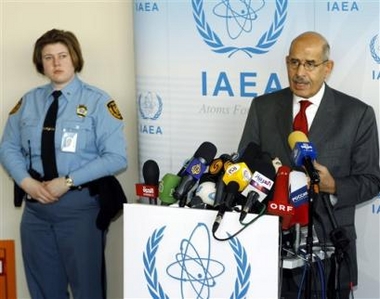|
Iran threatens full-scale enrichment work
(AP)
Updated: 2006-02-03 08:52 Iran threatened to retaliate
Thursday in the face of almost certain referral to the U.N. Security Council for
its nuclear activities, and the head of the International Atomic Energy Agency
said the dispute was "reaching a critical phase."
Ahead of a decision by the IAEA's 35-nation board, U.S. and European
delegates turned to behind-the-scenes diplomacy to build the broadest possible
support for reporting Iran to the council over concerns it is seeking nuclear
weapons.

A security officer
stands next to IAEA's Director General Mohamed ElBaradei, right, as he
delivers a press statement during the International Atomic Energy Agency's
(IAEA) 35-nation board meeting on the escalating nuclear standoff with
Iran, Thursday, Feb. 2, 2006, at Vienna's International Center.
[AP] |
|
Iran's chief nuclear negotiator, Ali Larijani, in a letter made available to
the AP, warned IAEA chief Mohamed ElBaradei that referral would leave Iran no
choice but "to suspend all the voluntary measures and extra cooperation" with
the IAEA — shorthand for reducing IAEA monitoring to a minimum.
Cuba, Venezuela, Syria and a few other nations at odds with Washington
remained opposed to referral. India was said to be leaning toward supporting
referral.
Diplomats accredited to the IAEA meeting said backing for Iran had shrunk
among the U.N. nuclear watchdog's board since Russia and China swung their
support behind referral at an overnight meeting with the United States, France
and Britain — the other three permanent council members — that started Monday.
"There's a solid majority in favor of reporting," Gregory L. Schulte, the
chief U.S. delegate to the IAEA, told The Associated Press. "There's even a more
solid majority after Monday."
State Department spokesman Sean McCormack the number of nations expected to
vote against referral were in the "low to single digits."
Iran remained defiant. Larijani told ElBaradei that his country would
severely curtail agency inspections and resume uranium enrichment if reported to
the council.
Furthermore, "all the peaceful nuclear activities being under voluntary
suspension would be resumed without any restriction," said the letter,
suggesting a resumption of work on full-scale uranium enrichment — a possible
pathway to nuclear arms.
Iran has made such threats before. What was significant this time, however,
was that the warnings were in the form of a formal notification to the head of
the IAEA.
As Thursday's meeting adjourned, U.S. and European diplomats intensified
efforts to widen support for a European draft resolution calling for Iran to be
brought before the council.
ElBaradei said there was a "window of opportunity" to defuse the crisis,
stressing that even if the issue is referred, the Security Council would not
take up the issue before next month.
"We are reaching a critical phase but it is not a crisis," he said.
|